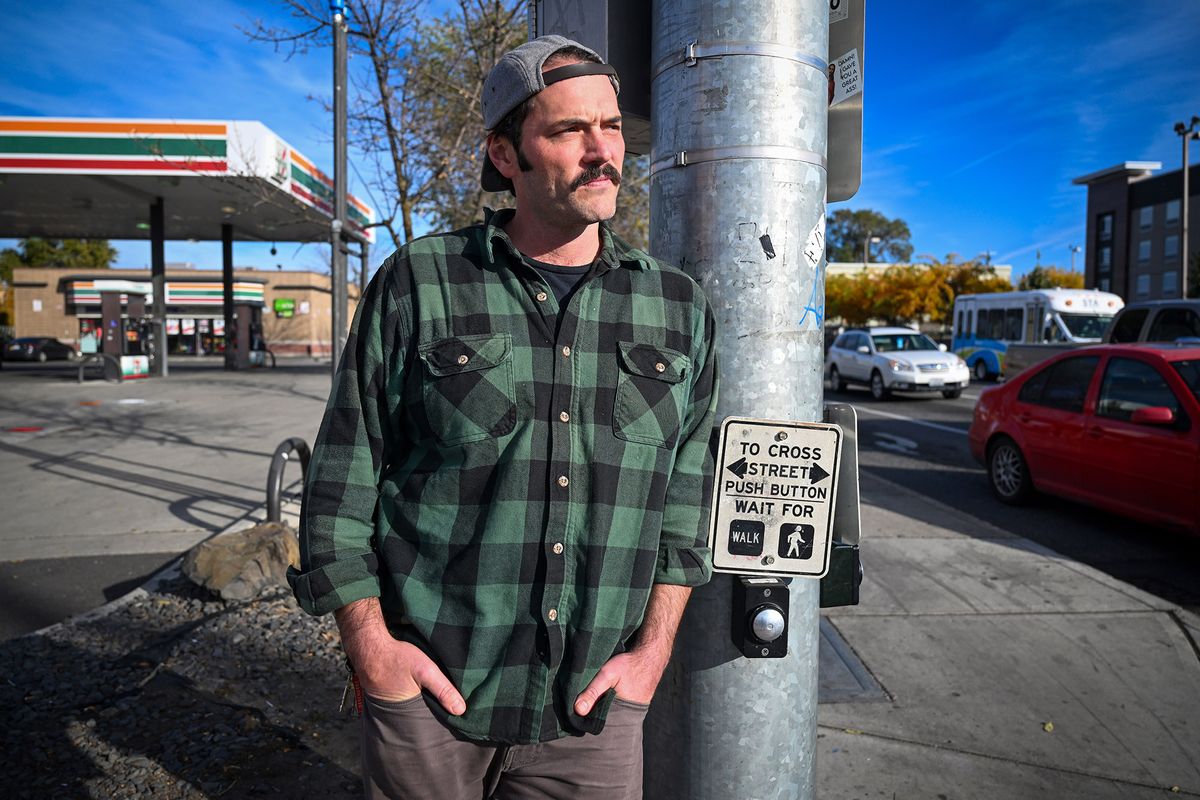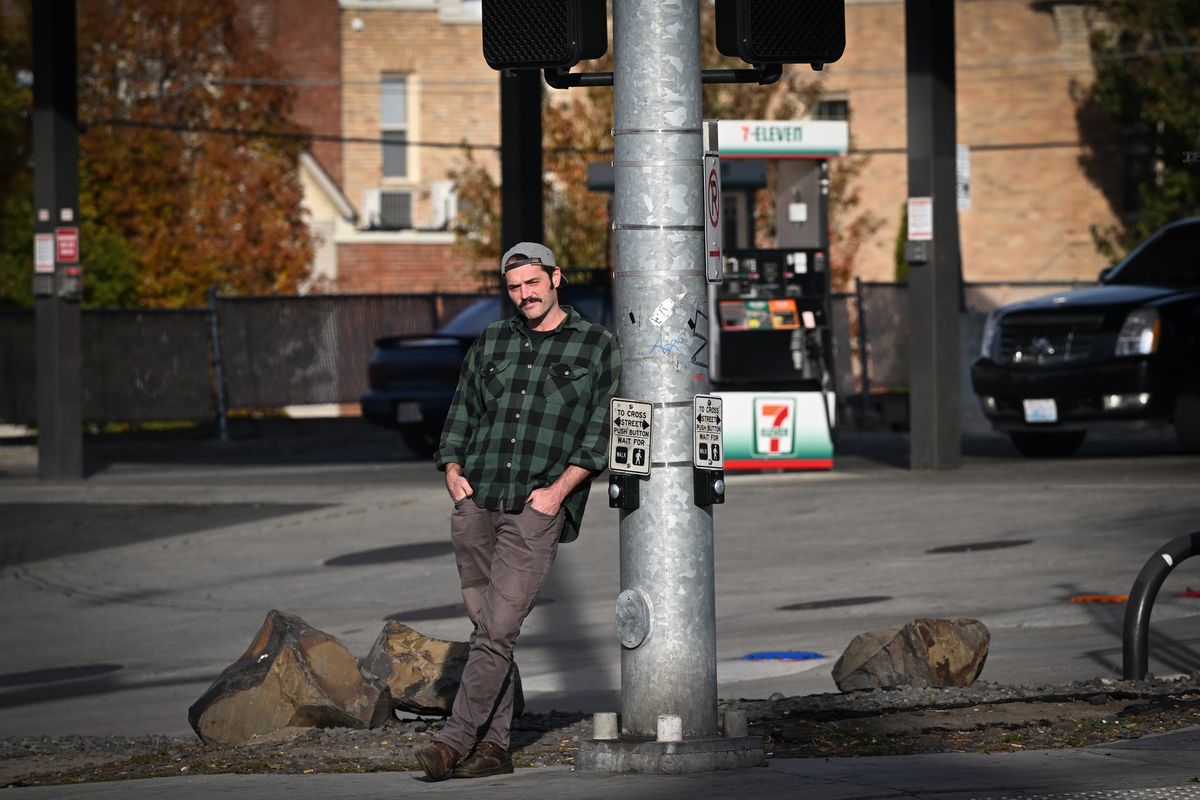The ballad of Second and Division: Plight of Spokane’s infamous intersection chronicled in new song from local musician Matt Mitchell
Musician Matt Mitchell, a singer-songwriter from Spokane, stands at the corner of Second Avenue and Division Street on Friday in downtown Spokane. The location echoes his song “Boostrap Nation” about the people who frequent the troubled intersection. (Jesse Tinsley/The Spokesman-Review)
The 7-Eleven on Second and Division, sings musician Matt Mitchell, is “where all the hard luck falls.”
“Shells of people stumbling around,” he continues, “breaking down against that wall.”
The people at Spokane’s notorious intersection, where homelessness is rampant and fentanyl foils litter the sidewalks, were chewed up and spit out by some falsehoods of the American dream, Mitchell believes – the same one that promised a good job, a good family and a traditional white-picket fence – but were instead shattered by the horrors of substance use.
“Everyone’s arguing over what to do with all the blood,” Mitchell says. “But no one is talking about why we’re bleeding.”
Mitchell is 40 and has seen the good, the bad and the in-between of his city. He is a Lewis and Clark High School alum and the former front man of Trego, a band with more than a decade of history in the area.
Today, he travels across the Pacific Northwest to perform in Seattle, Portland and anywhere people will listen, and largely credits his talent to his mother, who supported his boyhood ventures in piano playing.
Mitchell’s music is Americana style, a vulnerable and forthright perception of life, especially life in the Pacific Northwest – including the brutal honesty of “Bootstrap Nation,” released this year as part of Matt Mitchell Music Co.’s album, “Obvious Euphoria.”
It all started one day as he drove by the intersection, where Mitchell, like he’s done so many times before, watched people with backpacks and carts fall over in a zombie-like haze with what little belongings they have resting at their feet.
The spot is considered a crisis point where drug users openly smoke fentanyl and overdose calls are common. Spokane Mayor Lisa Brown declared a citywide emergency over the intersection in June, and former Mayor Nadine Woodward called for more police patrols in the area last year, citing “foils, feces and tons of garbage.”
Although Mitchell didn’t set out to make a “point” when he began to write the song, it felt like “pulling a string,” he says. Once he opened with the highly politicized and divisive place familiar to everyone in Spokane, he didn’t stop.
He also sings of a typical all-American teenage football player, who was talented in comparison to his “washed up father” until he was injured under the glare of the stadium lights, carted away and prescribed a bottle of pain pills.
“Well, I guess that’s the nature of the Bootstrap Nation
From the gutter to the pharmacy
Find yourself a means of exploitation
There ain’t nothing you can’t be
This American dream.”
The song continues to reference people’s family members; a mother, father, brother, grandma, even an unborn child or the homeless kid “you wish would go away,” which was a purposeful reference from Mitchell to imply falling victim to substance abuse – and ending up at the corner of Second and Division – could happen to anyone.
“I’m alluding to the fact that those are human beings on that street corner,” he says. “We’re dehumanizing and dividing each other at an alarming rate.”
Mitchell has witnessed addiction in the city. When he was a teenager, it felt like kids all around him were being prescribed opioids left and right.
“I feel fortunate that I got through that, but I know a lot of people didn’t,” he says. “I bet you a good portion of people down there cut their teeth on drugs that way.”
While the song is meant to humanize the people in Spokane who have nothing more than the clothes on their back and a fentanyl addiction, it also presents a bigger concept to those who find themselves listening to it.
“It’s art. That’s the point of art,” Mitchell says. “It’s to be thought-provoking and invoke emotion.”
David Pimentel, a law professor at the University of Idaho, focuses on musical expression and its relationship with the justice system and society. He says it’s why music about vulnerable or oppressed populations is so important: It is a powerful way to bring “a message to an audience who otherwise wouldn’t be looking for it,” Pimentel says.
His classic example to showcase the effects of tense, hot-button music is the song “Black and Blue,” written by Fats Waller in the 1920s and later covered by Louis Armstrong.
“The reason he’s blue, the reason he’s down and depressed is because he’s treated badly, because he is Black,” Pimentel says. “And unlike a lot of Black musicians in the early 20th century, he developed a huge following among the white and privileged communities.”
The same influence is seen today, Pimentel notes, but more so with different types of music – notably hip-hop musicians, who sing and rap about racial injustice and police brutality, and who have also developed a following from white communities.
“There was an idea that a young kid from the projects is really scary,” he said, “but a song can make you remind yourself that it’s just a kid.”
That same fear-driven concept can be applied to “Bootstrap Nation” Pimentel says. Some people may think, “I go out of my way to avoid that intersection because it’s scary and homeless people are scary,” he added, but identifying the place with specificity, a place all people in Spokane know, and personalizing its impact, is what makes the song stick.
“It’s one thing to say, ‘This is unjust,’ and that just doesn’t resonate with you the way it could if it could be your kid or your brother or your mom,” Pimentel says. “These songs bring it home and make it live for you … It sounds like a song about Spokane that maybe has the potential to do that.”
Mitchell knows that no mayor is going to come to the city and solve homelessness. It’s a trap, he says. The problem is a symptom of a greater issue.
“I travel a lot, and especially in Seattle or the other side of the state, people have sort of a bad look on their face when they hear about Spokane. I think the majority of the time, it’s unfounded,” Mitchell says. “Spokane feels like a small town, but it has all the big town problems. And that’s the disconnect.”
Matt Mitchell Music Co.’s next Spokane show is Nov. 16 at the Chameleon.



